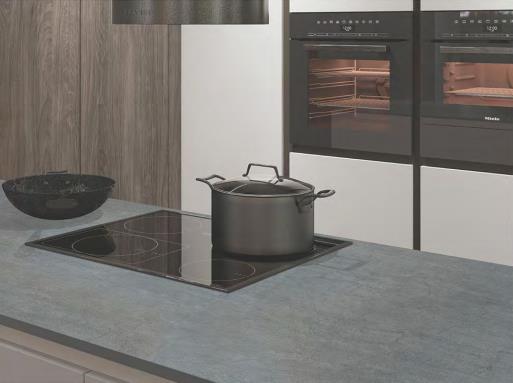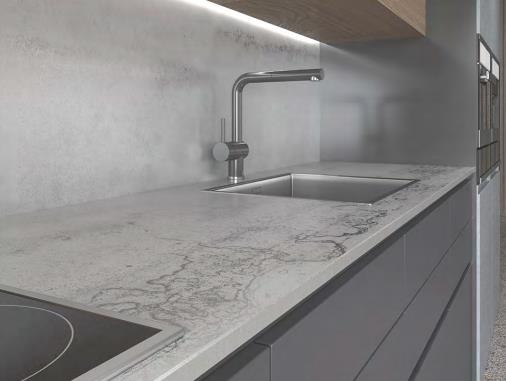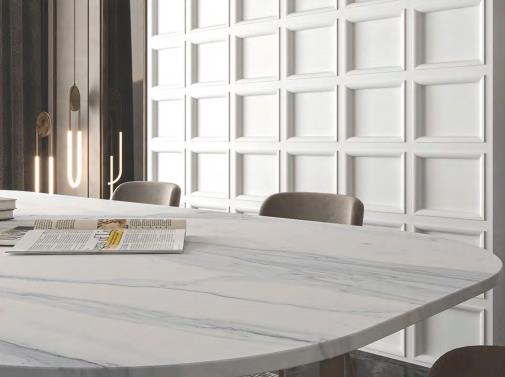Porcelain slab is a type of construction material that is made from a mixture of clay and other minerals. It is then kiln-fired at very high temperatures to create a strong, hard surface.
Porcelain slabs with patterns have a design printed on them before being kiln baked. The technology of the printers achieves the photographic reality of any product desired.
▪Fewer Joints and Seams
Due to the large size of the specifications,porcelain slabs are excellent for a seamless look that is very luxurious.
Blog Series:Go Big with Porcelain Slab
▪Heat-Resistant
Porcelain slabs survive extreme heat during the firing process, making them remarkably resilient for kitchens - able to withstand any temperature fluctuations in your home.

▪Do Not Stain
Porcelain slabs are the perfect choice for residential use due to their less porosity. With its unique characteristic, this material is an ideal solution for a variety of home renovation projects.
▪Does Not Get Scratched or Worn
With an increased capacity for strength and durability, porcelain slabs are the ideal choice when searching for lasting materials in both residential and commercial applications.
▪Uses Less Grout
Fewer joints and seams requires less grout and less mess during installation, meaning the end result is more visually appealing.
▪Various Surface Designs
Unleash your imagination! From bold solids to floral prints, from geometric patterns to the look of stone or wood - even a concrete design is possible.

▪So Many Applications
From floors to walls, and from fireplaces to swimming pools - porcelain slabs are the perfect addition for creating a unique home. They can be used indoors or outdoors in countless ways: as countertops, backsplashes, bathroom tubs/showers surrounds even outdoor patio spaces.
▪Easy Installation
Starting with an adhesive for installation and then sealing all seams with either cement or epoxy grout. It's best left to reliable professionals for flawless results that stand the test of time.
▪Can Be Installed on Existing Surfaces
Porcelain slabs provide an easy and elegant solution for home renovations – no need to rip out existing floors or countertops - simply lay overtop.
▪Easy to Maintain
Porcelain slabs offer unbeatable beauty for minimal effort - with no upkeep or maintenance required to keep them looking stunning. Plus, these robust surfaces are easy to clean and difficult to damage.
Porcelain Slab Cabinetry

Porcelain Slab Dining Table

Porcelain Slab Door Panel

Porcelain Slab Backsplash

Porcelain Slab Kitchen Island Countertop

Blog Series: Definitive Guide:Porcelain Slab Countertops Pros And Cons
Porcelain Slab vs Quartz Countertops-What You Want to Know
Must-Read FAQs of Porcelain Slab Countertops2022
Porcelain Slab Full Height Backsplash

Porcelain Slab Wall

Porcelain Slab Flooring

Porcelain Tile Stairs

By Type of Edge
As with all other materials, your porcelain slab must have a finished edge. However, unlike other materials, porcelain slab has a limited edge. These slabs are typically 6- 12 mm thick and they can be very brittle prior to installation. This means that square edges are the most common. Of course you can also choose beveled and bullnose edges, but any additional requirements will add to the cost of the project.

By Type of Finish
Porcelain slab is available in two finishes - polished and unpolished. Most manufacturers offer both finishes, and some offer different finishes in different colors. Polished porcelain slab is slightly more expensive than unpolished porcelain slab, depending mainly on the manufacturer.

By Choice of Color
Color is not a huge driver behind the cost of porcelain slab. Because porcelain slab is man-made, color has little impact on cost. You can choose porcelain slab in a range of popular colors such as white, tan and black.
Related article:Porcelain Slab Colors: Finding Your Perfect Hue
Porcelain Slab & Granite Slab Cost
Granite slabs are made from stones quarried from the ground. They come in a variety of colors and styles, and each one is unique. Porcelain slab is a man-made material, so there can be countless porcelain slabs of the same color and style.
Most granite slabs are 2 or 3 cm thick, while porcelain slabs are mostly 6-12 mm thick. Obviously granite slab is thicker than porcelain slab and thus easier to work with and ship.
Both are available in comparable price ranges. However, granite slab requires more maintenance and needs sealers and special cleaners, so the maintenance cost will be higher.
Blog series:Porcelain Slab vs. Granite,Come And Choose!
Porcelain Slab & Quartz Slab Cost
Porcelain slab and quartz slab are both popular man-made slabs with low maintenance and high durability. Unlike granite slab, which requires special maintenance, these two slabs do not require sealers or special cleaners.
However, the composition of the two slabs is very different. Porcelain slab is made from compressed clay powder, which makes it recyclable and easy to produce. Quartz slab is made from 93% natural quartzite mixed with resins and pigments. It can be made in different thicknesses, usually thicker than porcelain slab, but it is not recyclable.
The production costs are comparable, but quartz slab may work out cheaper if you have a smaller surface area to cover.
Porcelain Slab & Marble Slab Cost
Marble is a natural stone that is much softer than granite. Like granite slab, marble slab varies in color and appearance. However, you should be warned that marble slab can easily corrode or dull when it comes in contact with chemical liquids.
Porcelain slab is often designed to look like marble slab, but it is much easier to maintain. It does not dull or corrode, and it does not require special cleaners or sealers. However, porcelain slab is thinner and more difficult to transport and handle than marble slab.
When we look at the cost in general, porcelain slab is cheaper. However, there is an important difference here. Because marble is a natural stone, it does not need to be manufactured like porcelain.
This means that the cost difference comes down mainly to the installation process. Installing porcelain slab, which is thinner, requires more attention to detail than installing marble slab, so if you look at the installation aspect, porcelain slab costs a little more.
At Sunvin Ceramics, you'll find superior quality porcelain slabs at unbeatable prices - the perfect combination for achieving your creative vision.Factoring in thickness, size, finish, texture and pattern , etc. ,our high-quality porcelain slabs can go anywhere between regular prices from 135 to 270RMB per square meter.
We sell porcelain slabs, which are 3-12mm thick, durable, versatile, and visually stunning. With our porcelain slabs, you can create a unique and personalized look with limitless options to choose from.
Browse the Sunvin Ceramics website and request a quote for porcelain slab for your next project.